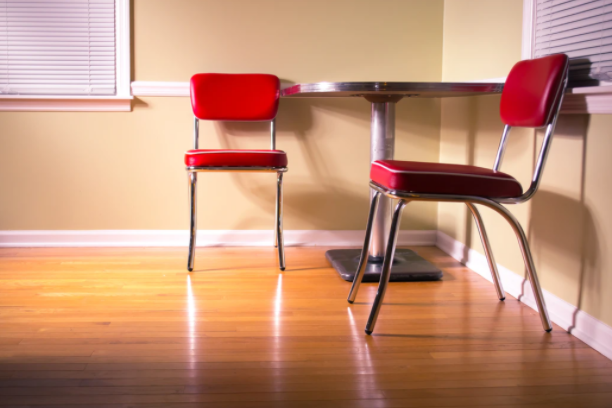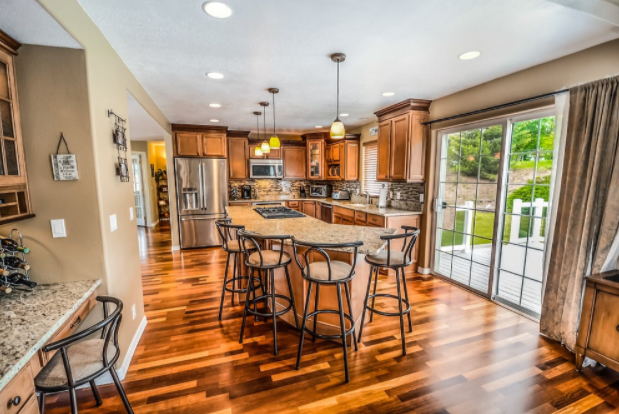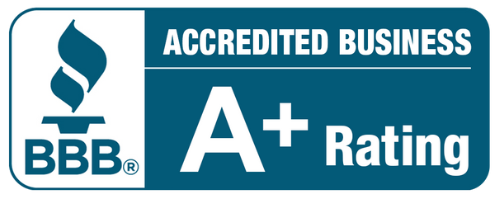
Kitchen floors have to be tough and resilient. Not only is the kitchen one of the most trafficked places in your home, but it is also frequently subjected to spills and stains. In addition to general durability and performance, you will also most likely want to choose a flooring option that represents your style and design preferences. The desire for exceptional performance and design can make it hard to decide on the perfect flooring option for your kitchen remodel. Therefore, a list of flooring options are compiled, discussed, and compared below. When comparing different flooring options for your kitchen you should rate them accordingly to cost-effectiveness, style, comfort, and ease of cleaning.
1. Porcelain Tile
Porcelain tile is an upgrade form of ceramic tile that combines extreme durability with good looks. Tile flooring is offered in a variety of colors and designs, which should make it easy to find a pattern that suits your taste. Porcelain tile is a good choice for your kitchen remodel no only for its toughness but also because it is easy to clean and rarely stains.
2. Vinyl

Homeowners remodeling their kitchens on a budget will find vinyl flooring options offered in a variety of colors and styles in either tiles or sheets. Overall, sheet vinyl provides more advantages than tile vinyl. Sheet vinyl is one of the least expensive flooring materials, very easy to clean, and waterproof and stain-proof. Homeowners who spend a lengthy amount of time in their kitchen will also appreciate that vinyl flooring is easier on their feet and joints. It is also forgiving of dropped dishes and glasses.
3. Hardwood
If you have an open floor plan and are looking to have a single type of flooring connecting your rooms, hardwood flooring is a great choice for your kitchen remodel. Compared to vinyl and porcelain tile, hardwood flooring will be more expensive and slightly less resistant to stains and scratches. However, for what it lacks in cost-effectiveness, hardwood flooring makes up for in style and design. Individuals uneasy about installing expensive hardwood floors in the kitchen can opt to install luxury vinyl plank. This material mimics hardwood flooring at half the cost.

4. Linoleum
Unlike engineered hardwood flooring, linoleum floors are a green flooring option that is made renewable materials. This flooring option is also available in a wide variety of styles and colors. Overall, linoleum flooring can withstand high foot traffic and is moderately effective at vanishing stains. However, it is important to ask if the linoleum flooring you are purchasing comes with a protective coating. If not, the flooring will stain and scratch very easily.
5. Cork
Individuals looking to switch things up a bit in their remodeled kitchen can look to install cork flooring. Kitchen floors constructed from cork are waterproof and highly resilient. The flooring material is normally sold in large tile sections which makes it relatively easy to install. Cork is also quite easy to clean. However, cork flooring does require some continued maintenance. About every year or two you will need to have your cork floors refinished to prevent them from cracking and staining.
The Perfect Floors
When remodeling your kitchen, deciding what flooring materials to install can be difficult and overwhelming. However, any of the materials above will provide a variety of advantages to your kitchen. When comparing materials it is important to factor in cost, durability, design, and ease of cleaning. You should also inspect if different flooring models can work alongside radiant flooring heating systems if that is something you wish to have installed as well.
Matt Lee is the owner of the Innovative Building Materials blog and a content writer for the building materials industry. He is focused on helping fellow homeowners, contractors, and architects discovering materials and methods of construction that save money, improve energy efficiency, and increase property value.


